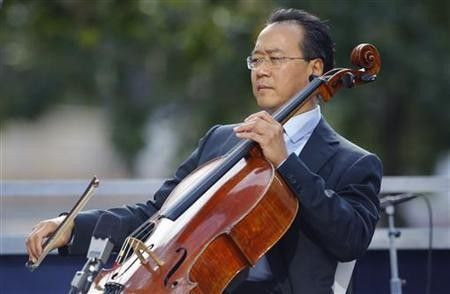Yo Yo Ma Turns to Bluegrass Music for New Album

He's known as one of the world's best classical cellists, but for his latest musical effort Yo-Yo Ma has dropped Bach and picked up bluegrass.
Grammy Award-winner Ma spent a year recording songs with bluegrass titans Edgar Meyer, Stuart Duncan and Chris Thile for a project entitled The Goat Rodeo Sessions, an 11-song set of original compositions, due out October 24.
Meyer, Duncan and Thile put some initial thoughts together for the tracks over the last year and then the four of them got together to develop and record.
We started off with the stories, like every culture, Ma told Reuters about this project. Every culture has its own brand of stories, its characters. There's nothing but similarities (between bluegrass and classical forms). This developed from people trusting and admiring each other. All the music I play is roots based, and it gets further along.
While it might surprise some that a proficient classical musician like Ma would transition to this version of Americana, The Goat Rodeo Sessions is Ma's second project with Meyer. The two recorded two albums with violinist Mark O'Connor -- 1996's Appalachia Waltz and 2000's Appalachian Journey.
But these sessions are different, not only with the expansion into a quartet of instruments, but also with the addition of Thile, whose creativity on the mandolin earned him notoriety first with his band Nickel Creek and now with the Punch Brothers.
The album drifts between playful songs like Attaboy and Less is Moi, that are tinged with folk elements, to softer, more poignant arrangements on Franz and the Eagle and Helping Hand.
Although most of the songs are instrumentals, Thile is joined by Crooked Still's Aoife O'Donovan for vocals on Here and Heaven and No One But You.
BLENDING WITH BLUEGRASS
The cello isn't thought of as a traditional bluegrass instrument the way the banjo is, but Ma said its malleable nature makes it blend-in without sounding out of place.
The cello, as usual, can do a number of different roles, he said. Sometimes I'm trying to match the violin, the bass, the mandolin. I shift around a little bit -- sometimes we're equal voices, sometimes we're particular roles.
The title of the record, The Goat Rodeo Sessions, is a nod to the expression, goat rodeo, which is often used to describe a situation in which a thousand things must go right in order for something to work.
My worst nightmare was that (the album) would sound like worlds colliding, Thile said. Music shouldn't sound like some new patchwork genre. The idea was to come up with a collaboration that is seamless. Like a new organism, as opposed to a Frankensteinian monster.
While the songs were written prior to hitting the recording studio, the group allowed themselves to improvise and evolve during rehearsals. Doing so gave the record a more loose and flowing sound than with classical or bluegrass standards.
I think the music that resulted was a product of a time or place, Thile said. People coming out of the hills and making Appalachia -- that's kind of over. It sounds to me like new music. It doesn't sound like classical music, it doesn't sound like bluegrass. It has this liquid feeling of the various times we were playing.
When I hear the, we are not in the 'whose the author' sort of thing, added Ma. The music would shift from one rehearsal to another where we'd get information about how the four voices interact and decide 'we should try something like this.' There was a wonderful evolution that occurred right during the recording sessions.
© Copyright Thomson Reuters 2024. All rights reserved.





















